'You've Got Mail' Turns 25: Unpacking Its Brilliance

- Oops!Something went wrong.Please try again later.
- Oops!Something went wrong.Please try again later.
- Oops!Something went wrong.Please try again later.
- Oops!Something went wrong.Please try again later.
- Oops!Something went wrong.Please try again later.
You've Got Mail
It didn’t win any Oscars, spawn any sequels or cost near as much—or make anything near as much—as the mega-movie released just weeks before it, Titanic. But the little love story called You’ve Got Mail that opened in theaters 25 years ago continues to do something big: It makes people happy.
“It’s the greatest film ever made!” effuses Erin Carlson, an entertainment journalist and author of three books on Hollywood history. “It’s my favorite movie of all time. It was such a fantasy for me. I draw so much comfort from Tom and Meg. They make me feel good.”
The comforting 1998 romantic comedy starring Tom Hanks and Meg Ryan and written and directed by Nora Ephron “harkened back to those romantic comedies starring Katharine Hepburn and Spencer Tracy, Margaret Sullavan and Jimmy Stewart,” says Carlson, adding that Ephron “reintroduced the elegance of Hollywood’s golden age, but made it contemporary” with “a funny, sophisticated, urban sensibility that was broadly appealing to everyone.” Carlson’s 2017 book, I’ll Have What She’s Having: How Nora Ephron’s Three Iconic Films Saved the Romantic Comedy, goes behind the scenes of the filmmaker’s beloved rom-com trio of You’ve Got Mail and Sleepless in Seattle (1993)—both of which she wrote and directed—and director Rob Reiner’s When Harry Met Sally (1989), which Ephron wrote.
Related: Laugh and Swoon With the 75 Best Romantic Comedies of All Time
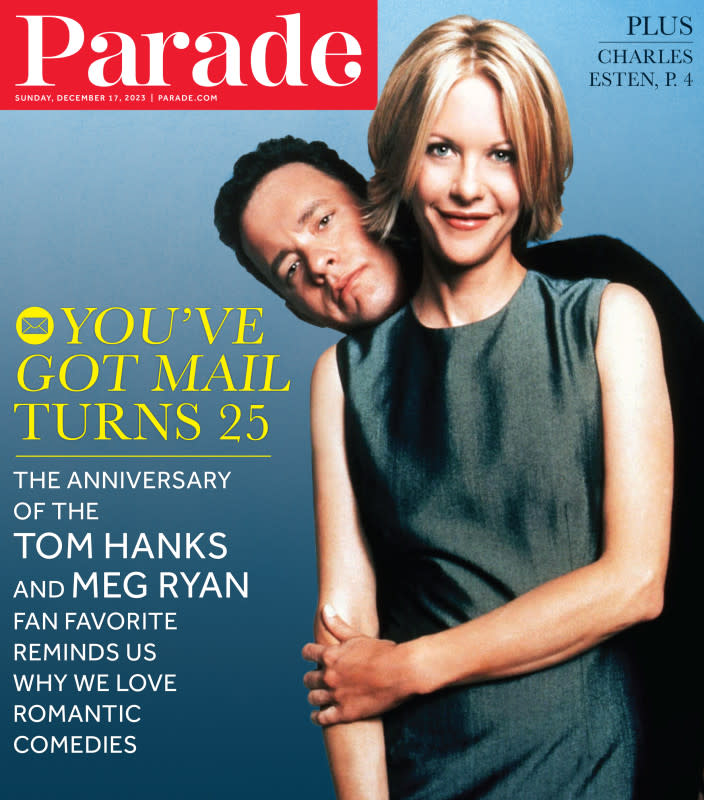
COVER PHOTOGRAPHY BY WARNER BROTHERS/ALAMY
A New York City native who died in 2012, Ephron is revered among fans of romantic comedy, says Carlson, for reinventing and contemporizing a format that had been largely marginalized by Hollywood as “a pink, fluffy category of ‘stuff women like,’ you know, and generally considered unserious—even though they’re about the most serious subject of all, which is love.”
Ephron wrote (and directed) with an invigorating sense of zippy wit and snappy intellect, breathed relatable life into engaging characters, reconnected romantic comedy to its own Hollywood legacy, and spun modern magic of wish fulfillment for grown-ups who longed for happy endings and true love. “Her films were the perfect combination of era, genre, public appetite for romance and comedy, and casting,” says Carlson, who once led tours in New York City of locations used in You’ve Got Mail and other Ephron films.
Carlson calls Ephron’s work the gold standard for the genre after it had been diluted by the cynicism of the 1970s. Exhibit A: Woody Allen’s Annie Hall, one of the most lauded movie comedies of that era. It had comedy, yes, and romance, yes, but its two main subjects come to realize their relationship isn’t working, and they move on. Not exactly a “happy ending.” So, in the strictest sense, it’s not a “true” romantic comedy. “Romantic comedies need happy endings,” Carlson says. “Otherwise, they’re not romantic comedies.”
Other movies may be funny, and they may feature romance, but it takes something more to qualify as romantic comedy—or rom-com, says Alicia Malone, the entertainment journalist and film critic who hosts the weekend series TCM Imports on Turner Classic Movies. “It’s very lighthearted; usually, it’s boy meets girl, girl meets boy. They may hate each other at first; they slowly fall in love. There'll be some type of misunderstanding, then some grand gesture, and they'll live happily ever after.” These comedies often feature strong female characters dominating witty battles of the sexes, adds Malone. “Throughout the decades they have given female characters a chance to be front and center and have interesting stories created for them and around them, which hasn't happened traditionally in many other genres.”
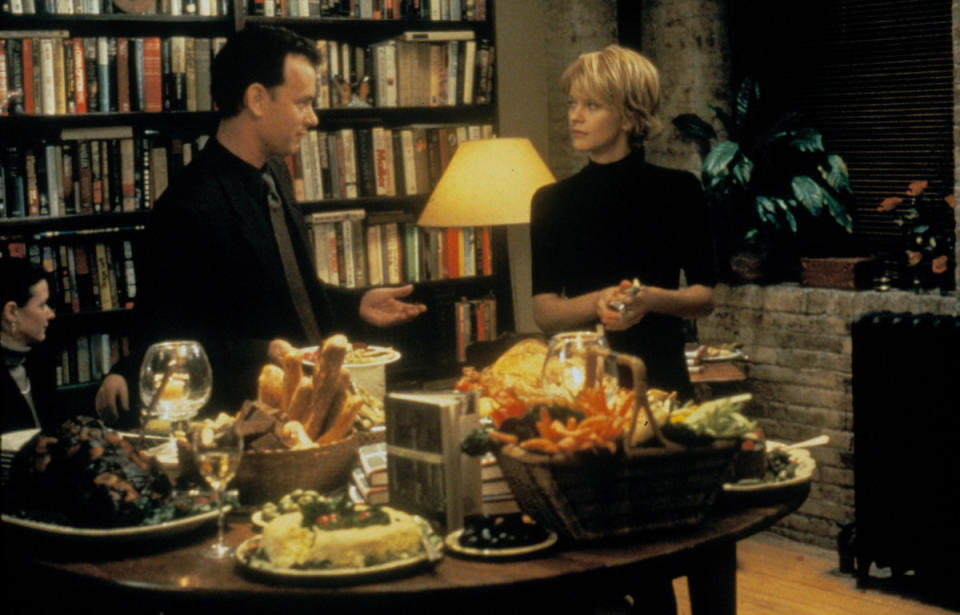
Warner Bros.
In You’ve Got Mail, released on Dec. 18, 1998, Hanks starred as successful New York business scion Joe Fox, whose massive chain of mega bookstores plans to put a smaller shop, owned by Kathleen Kelly (Meg Ryan), out of business. Kathleen and Joe start out loathing each other, but guess what? Improbably, implausibly, magically, they slowly fall in love—and live, presumably, happily ever after, just as they have for 25 years in our golden memories.
Romance meets technology
Thank a 1937 play, Parfumerie by Hungarian Miklós László, for inspiring previous comedies that led to You’ve Got Mail. The first comedy was The Shop Around the Corner from 1940, starring James Stewart and Margaret Sullavan, followed by a 1949 movie, In the Good Old Summertime, with Judy Garland and Van Johnson.
“It’s a very durable and perpetually charming story,” says noted movie critic and film historian Leonard Maltin of the tale that spread across the globe and across half a century—and was even made into a 1963 Broadway musical, She Loves Me.
The three films and the musical share the common thread of anonymous communication between two soulmates-in-the-making. In the Hungarian play, the first two films and the musical, the lead characters build their relationship secretly through mail, with neither knowing the other’s letter-writing identity. Ephron—who wrote the screenplay for You’ve Got Mail with her younger sister, Delia—updated and modernized the premise, cultivating Joe and Kathleen’s courtship in an email chatroom as they “hide” behind the screen names of “Shopgirl” and “NY152.”
The film depicted a moment in then-contemporary time when computers were just becoming portals to the so-called information highway for regular people. The movie avoided any reference to the shady online world of hackers, predators, virtual realities and nasty viruses, and instead focused on that euphoric moment for early internet users when they got that exciting ping signaling that “you’ve got mail.”
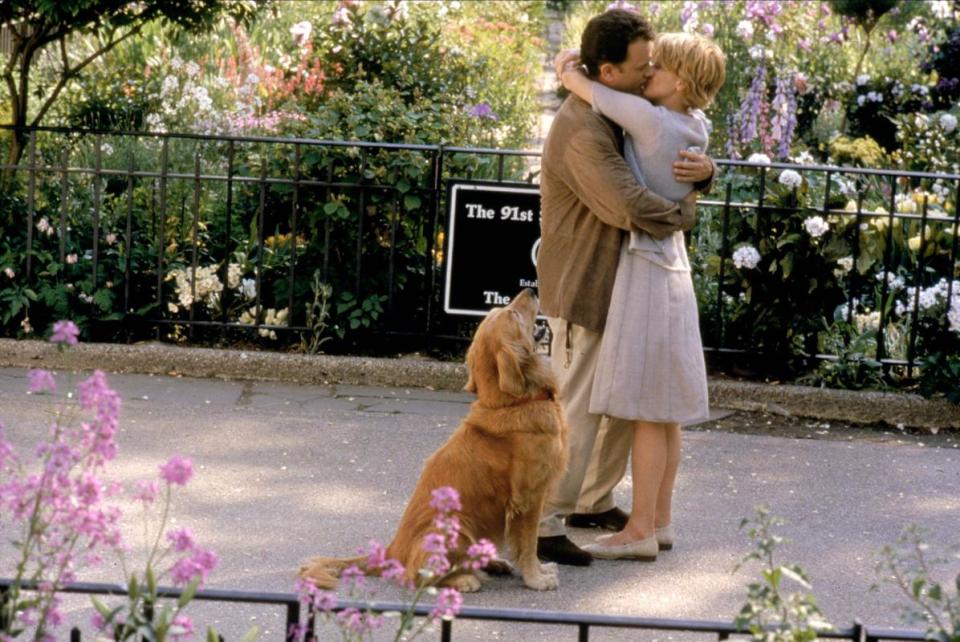
Warner Bros.
Carlson recalls in her book about Ephron how the writer/director approached AOL about incorporating its online platform into her movie. “They were initially wary,” she says. “Like, ‘Are you going to make this into an internet-is-bad’ thing?’ And she’s, ‘No, no, no, no!’ So, they threw her a ton of money for what was basically product placement and hoped for the best.”
And AOL was very pleased with its movie close-up. “Subscriptions went up because Tom and Meg made the internet look like a wholesome, friendly place,” Carlson says. “And you know, if anyone can make the internet look like a happy, wholesome place, it’s Tom and Meg!”
The movie “basically mainstreamed online dating,” she adds. “We can trace Match.com and Tinder all the way back to You’ve Got Mail. Now, if you [randomly] meet someone online, it’s probably going to be creepy.”
“It would be really tough to sell that premise today,” Malone agrees, “without it being about getting catfished or scammed.”
Related: We Ranked the 28 Best Tom Hanks Movies of All Time, From 'Big' to 'Elvis'
You've got chemistry!
The stars of You’ve Got Mail had what Hollywood calls “chemistry,” an onscreen connectivity between characters that makes their interactions, conversations and relationship seem natural, realistic and believable. That’s especially important in romantic comedy, says Maltin, pointing out that you not only have to believe the main characters, you also must want them to be together, and to remain a couple. “Rooting interest is crucial,” he says. And the two stars of You’ve Got Mail were perfect in that way. “Tom Hanks and Meg Ryan were adopted, you might say, as an ideal American couple. It’s no wonder they made three films together.”
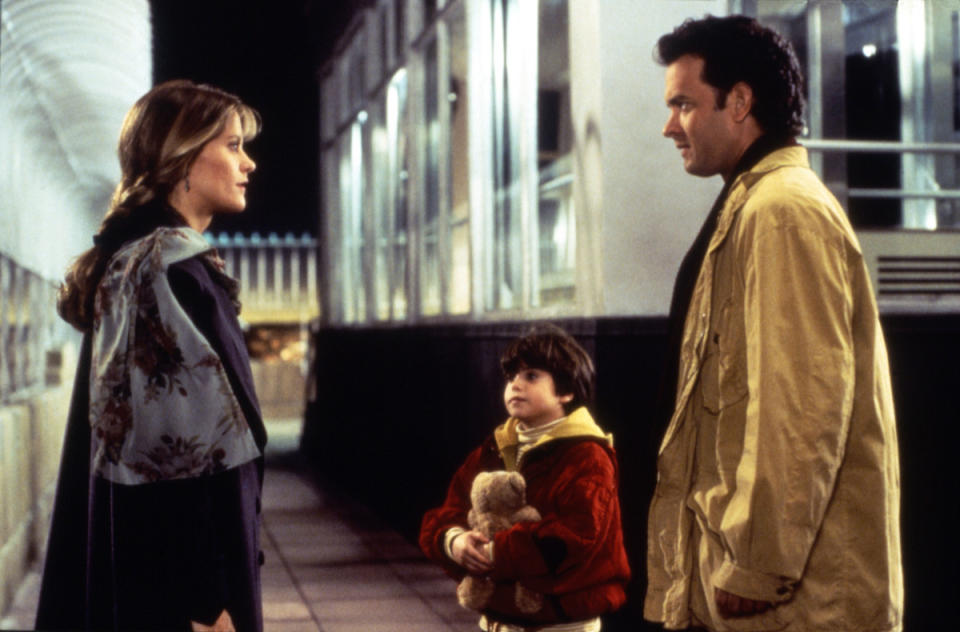
Tristar Pictures
Before You’ve Got Mail, they had co-starred in the 1990 comedy Joe Versus the Volcano and then Sleepless in Seattle. By the time Mail came along at the end of the decade, movie audiences were already comfortable and familiar with them as a twosome, and Hanks was a major movie presence—well on his way to being dubbed America’s favorite movie star—from hit films including Forrest Gump, Apollo 13, That Thing You Do! and Saving Private Ryan.
“He truly is a likeable actor,” says Maltin of Hanks. “And he makes the characters he plays likeable characters.”
Romantic comedies are almost always “fleshed out” by supporting players, which are essential casting elements. In You’ve Got Mail, the ensemble includes Greg Kinnear, Jean Stapleton, Steve Zahn and Parker Posey; in Sleepless in Seattle, it’s Rosie O’Donnell, Bill Pullman and Rob Reiner. When Harry Met Sally had Bruno Kirby and Carrie Fisher. “It helps build the realistic situation,” says Maltin. “People don’t exist in a vacuum. Don’t you wish you had a smart, sassy, best friend to advise you, like in a romantic comedy? Don’t we all want that?” And those loyal friends, coworker buddies and wisecracking sidekicks provide “an idea of who the main characters are and what they are like,” adds Malone. “They give so much life to the story.”
Ephron died from complications of leukemia at the age of 71. But her influence remains strong, and the mojo of her romantic comedies continues to blossom and bloom in the movies, sometimes with new, progressive twists.
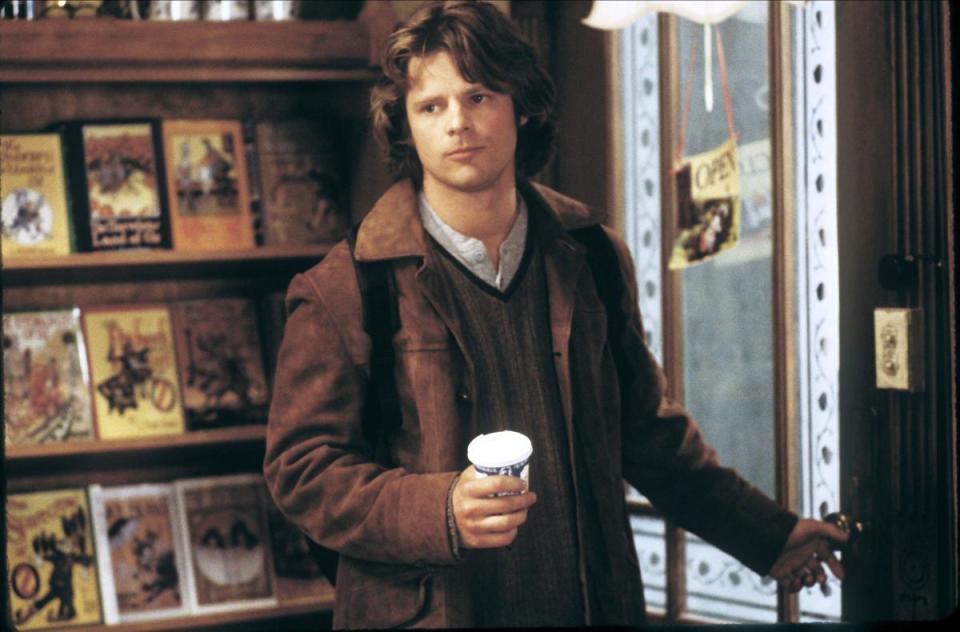
Warner Bros.
“One [example] is Red, White and Royal Blue,” says Malone, referring to the Prime Video film earlier this year about two young men—the son of a U.S. president and a royal prince—who fall in love. “It hit all the same beats of a traditional romantic comedy, but it felt fresh and modern with these two young male characters.” She also cites Bros, Billy Eichner’s 2022 rom-com about a pair of gay men in Manhattan who avoid commitment but are nonetheless drawn to each other. In that film, Eichner’s character at one point is watching a movie…and it’s You’ve Got Mail. “Everyone’s inspired by that film,” Malone says.
Carlson adds that actress Mindy Kaling—who broke out of TV’s The Office for her own projects—has professed her love for Ephron movies. “Her TV shows [The Sex Lives of College Girls, The Mindy Project] capture that kind of funny, feminine spirit,” Malone says. Rom-coms may change and adapt, but what hasn’t changed in modern-day romantic comedies is that power and belief in love, and love being transformational, she says.
A contemporary of Ephron’s, filmmaker Nancy Meyers, has also been very successful tapping into the modern rom-com zeitgeist with films including It’s Complicated, Something’s Gotta Give and Father of the Bride and its two sequels. “Nancy is another writer-director with a particular insight into women and how they tick,” Malone says.
But no filmmaker consistently found the sweet spot like Ephron. “Smart writing, great casting,” says Malone. “It all adds up to a movie that feels like a big, warm hug.” Ephron’s films, says Maltin, promote wishful thinking that our lives might turn out similarly. “Aren’t we all looking for a happy ending?” he asks. “Looking for the perfect mate? I think anybody, of any age or stripe, can relate to that. You want to live in that world.”
Next, Heat Up Your Holidays With the 42 Most Romantic Christmas Movies of All Time

